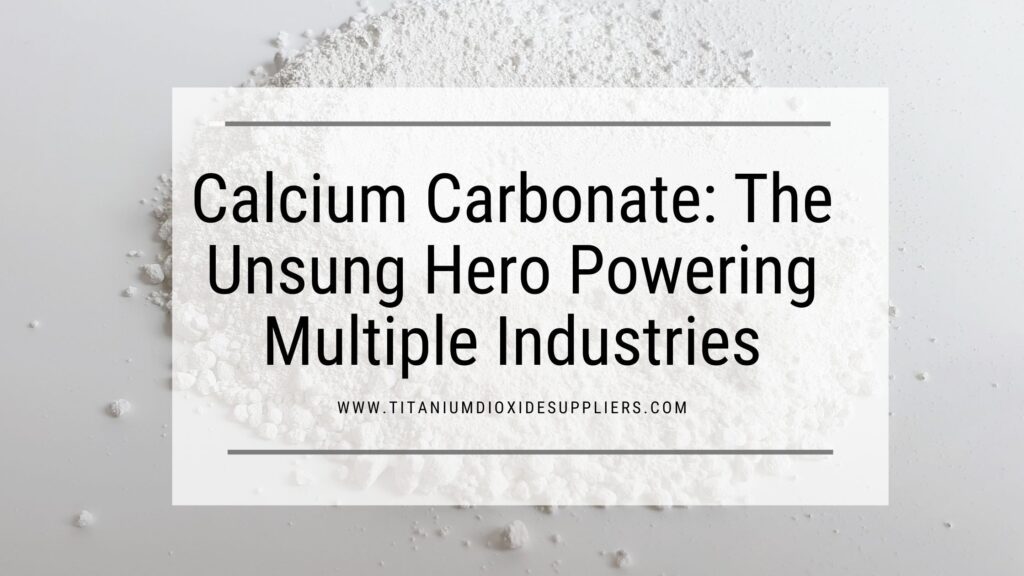When we talk about the essential materials that support modern industry, calcium carbonate often goes unnoticed. Yet, this naturally occurring mineral plays a crucial role across a wide range of sectors—from construction and agriculture to pharmaceuticals and food production.
Whether you know it as CaCO₃, limestone, chalk, or marble, calcium carbonate is everywhere. It’s in the walls of your home, the paper you write on, the toothpaste you use, and even the pills you take.
In this blog, we’ll explore what makes calcium carbonate so valuable, its many industrial applications, key benefits, and what to consider when sourcing high-quality CaCO₃.
What is Calcium Carbonate?
Calcium carbonate is a white, odorless, tasteless powder that naturally occurs in minerals such as limestone, chalk, and marble. Chemically, it’s composed of calcium, carbon, and oxygen (CaCO₃).
It is used in three primary forms:
- Ground Calcium Carbonate (GCC) – made by grinding natural calcium carbonate sources
- Precipitated Calcium Carbonate (PCC) – synthesized through a chemical process
- Activated Calcium Carbonate – modified with additives for specific industrial use
Top Industries That Use Calcium Carbonate
1. Construction and Building Materials
Used in cement, concrete, and lime production, calcium carbonate acts as a filler, stabilizer, and strengthening agent in construction materials.
2. Plastics and Polymers
It serves as a filler and extender, improving the durability, brightness, and cost-effectiveness of plastic products.
3. Paints and Coatings
Used to enhance whiteness, opacity, and consistency, CaCO₃ is a key ingredient in premium paints and coatings.
4. Paper Industry
Calcium carbonate improves the brightness, smoothness, and printability of paper. PCC is especially common in glossy paper.
5. Pharmaceuticals
It is used as an antacid, calcium supplement, and tablet binder in pharmaceutical manufacturing.
6. Food and Beverages
Food-grade calcium carbonate is used in baking powder, cereals, and as a dietary calcium source.
7. Agriculture
Applied to soil to neutralize acidity and enrich it with calcium—essential for plant growth.
8. Water Treatment
Helps in adjusting pH levels in water, making it safe for industrial and residential use.
Benefits of Calcium Carbonate
- Abundant & Cost-effective: Widely available and relatively low-cost.
- Eco-friendly: Naturally occurring and recyclable in many applications.
- Versatile: Suitable for hundreds of applications across industries.
- Enhances Product Properties: Improves strength, brightness, and stability.
How to Choose the Right Calcium Carbonate Supplier
Not all CaCO₃ is created equal. When sourcing calcium carbonate, consider the following:
- Purity Level: Especially important for pharmaceuticals and food.
- Particle Size: Determines its effectiveness in applications like paints or plastics.
- Form: GCC vs. PCC depending on the application.
- Moisture Content: Impacts shelf life and reactivity.
- Packaging & Handling: Bulk supply? Powder form? Safe transport?
If your business relies on consistent quality and compliance, partnering with a reliable industrial chemical supplier is critical.
Sustainability and Calcium Carbonate
As industries move toward greener alternatives, calcium carbonate offers environmental advantages:
- Reduces carbon footprint when used as a substitute for polymers in plastics.
- Enhances the recyclability of products.
- Safer alternative to harsh synthetic chemicals in cleaning or agriculture.
Conclusion: Calcium Carbonate is the Backbone of Modern Industry
From the walls around you to the products on your shelf, calcium carbonate touches your life more than you may realize. Its versatility, affordability, and functionality make it a cornerstone for industries around the world.
Whether you’re a manufacturer, formulator, or trader, choosing the right calcium carbonate supplier can make all the difference in product performance, compliance, and cost-efficiency.
Looking for premium-grade calcium carbonate?
[Contact Us Today] to learn more about bulk supply, product specifications, and custom formulations.
FAQs About Calcium Carbonate
Q1. Is calcium carbonate safe for human consumption?
Yes, food-grade and pharmaceutical-grade calcium carbonate is safe and widely used in dietary supplements and antacids.
Q2. What is the difference between GCC and PCC?
GCC is physically ground natural CaCO₃, while PCC is synthetically processed, allowing for controlled particle sizes and shapes.
Q3. Can calcium carbonate be used in cosmetics?
Yes. It is used in face powders, foundations, and toothpaste due to its gentle abrasiveness and whitening properties.
Q4. What industries use the most calcium carbonate?
Construction, plastics, paper, and paint industries are the top consumers globally.
Q5. Is it safe for the environment?
Yes, it’s non-toxic and naturally occurs in the environment. It’s also used in eco-conscious formulations in various industries.





